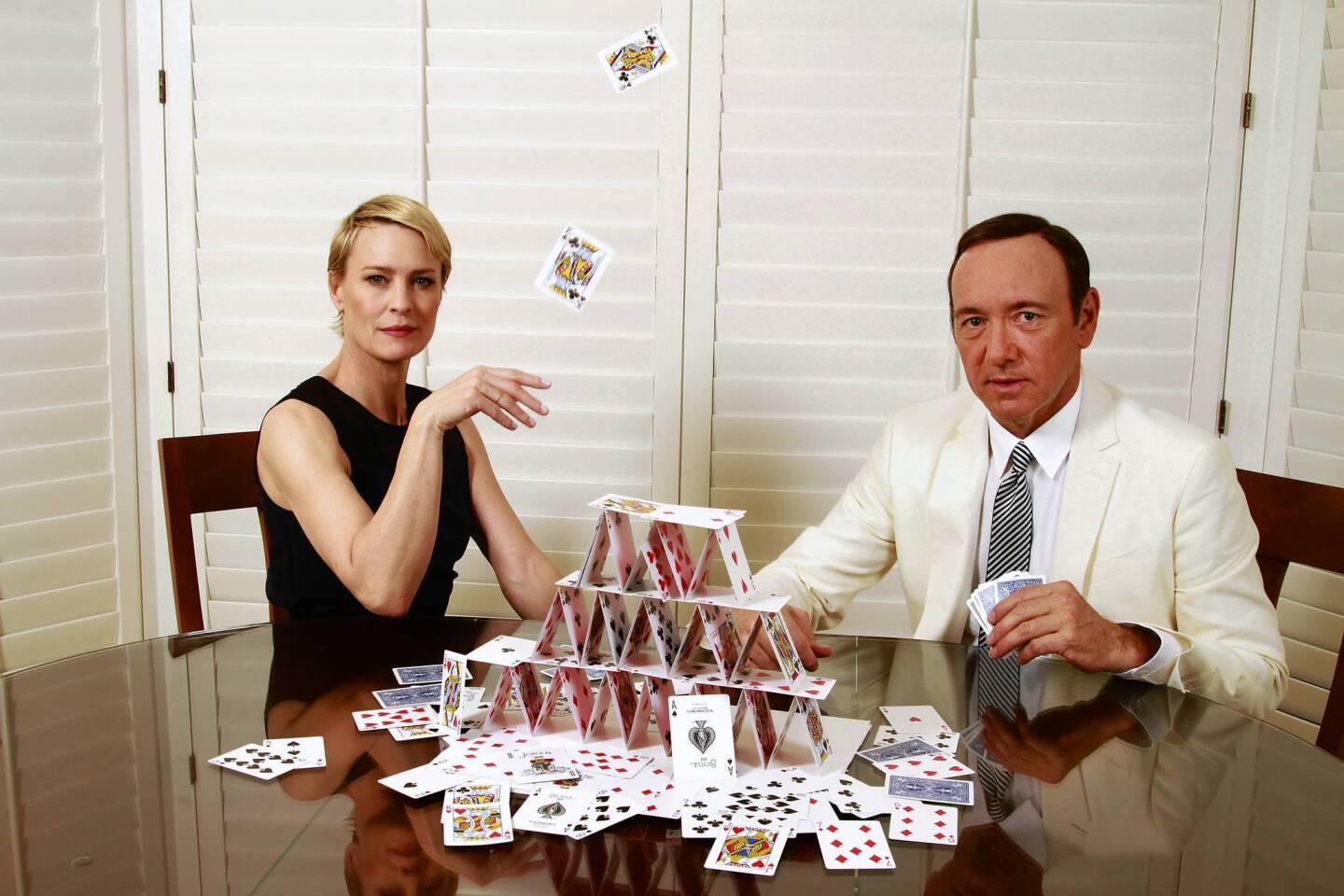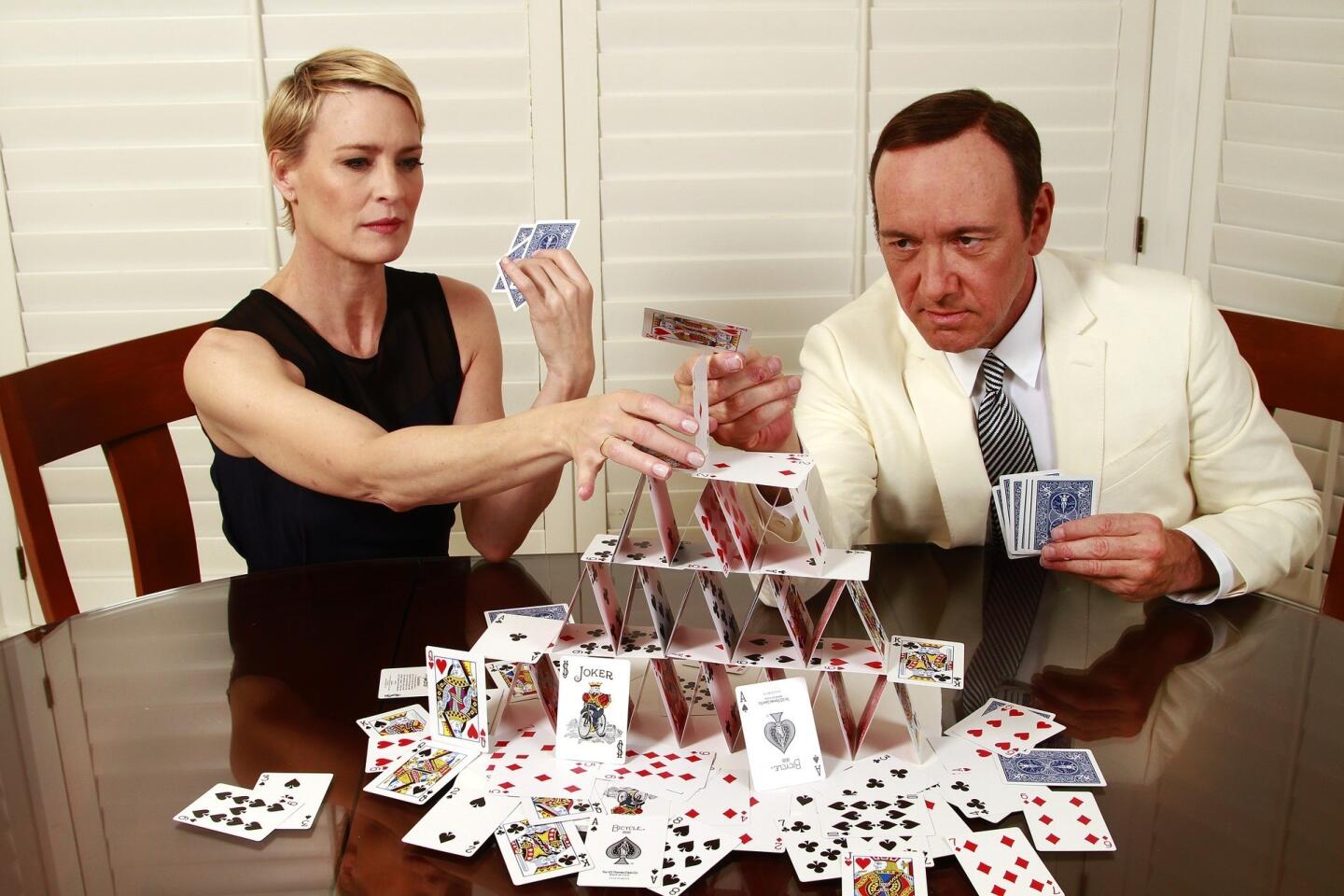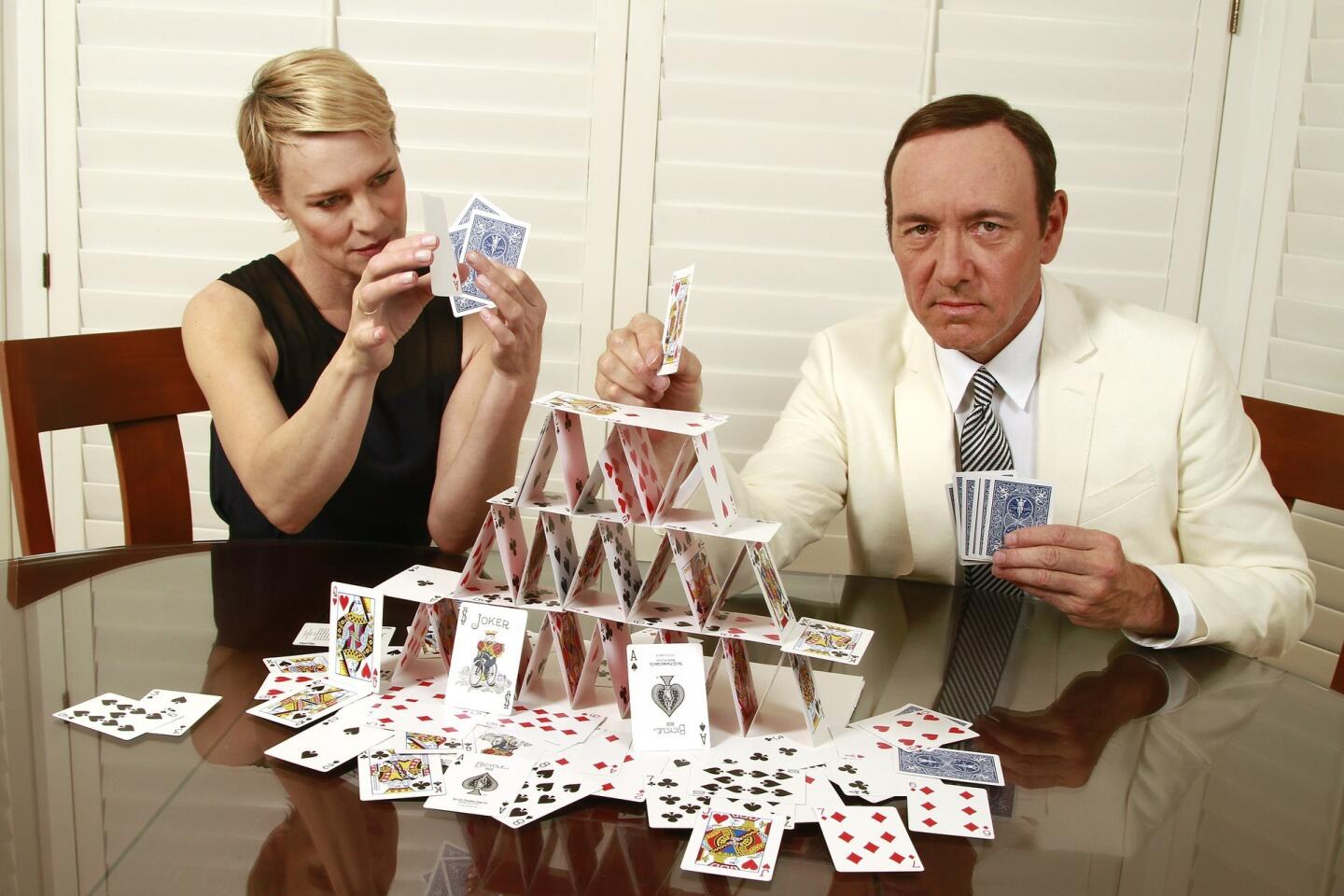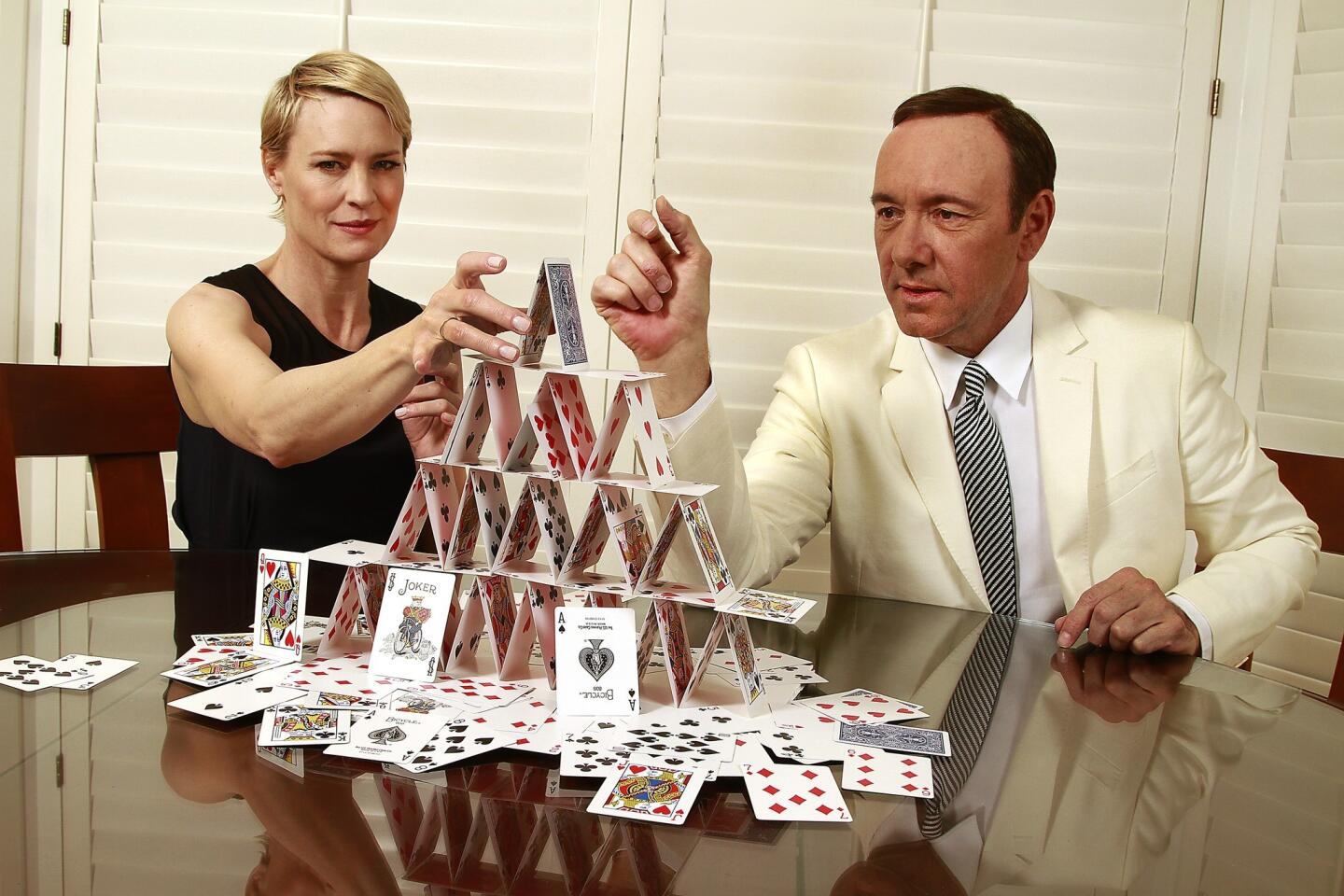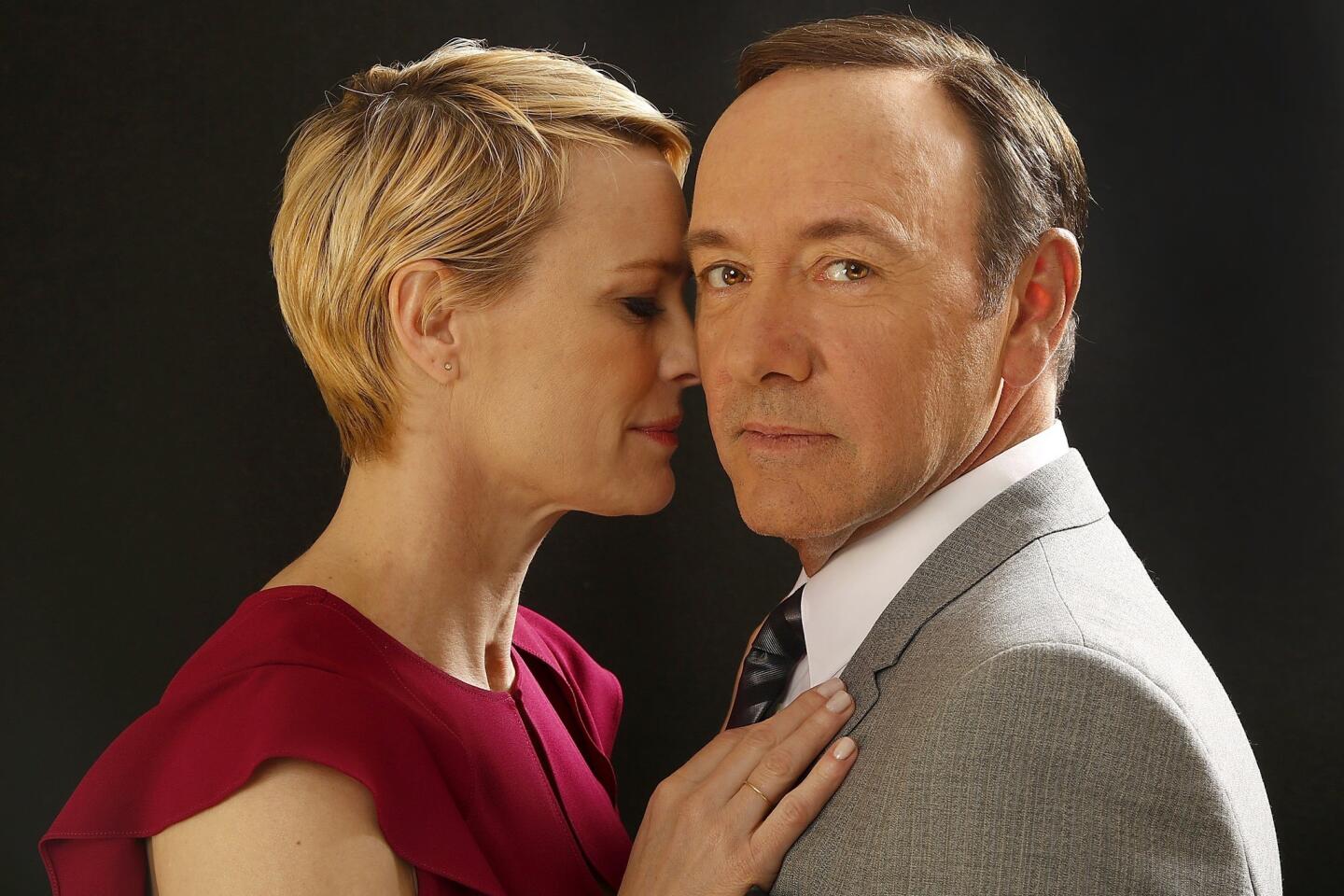How ‘House of Cards’ became an Emmy powerhouse for Netflix
- Share via
Some three years ago, when “The Social Network” director David Fincher and executive producer Kevin Spacey took a pizza break across the street from the West Hollywood lot where the picture was shooting, Spacey mentioned a BBC series about political machinations called “House of Cards.” “Do you know this series from Britain?” Spacey recalls asking. “Do you think it would be interesting to maybe adapt it?”
Sitting in shorts, sneakers and a pinstriped shirt on the patio of the Beverly Hills Hotel’s Polo Lounge recently, awaiting the arrival of Robin Wright, his acting partner in the resultant Netflix series about scheming Washington insiders, Spacey recalls just how long the odds were. Even boasting two Oscar wins, as Spacey has, and two nominations, as Fincher has, didn’t necessarily qualify them for the intriguing hybrid of TV, film and Web content they would propose. And they also wanted full creative freedom, with no demands for a pilot.
FOR THE RECORD:
“House of Cards”: An article in the May 30 Envelope section about “House of Cards” quoted actor Kevin Spacey as saying he pitched the idea for the series to director David Fincher. In fact, Spacey was relating how Fincher pitched the idea to him.
Given that Spacey, Wright et al. are currently very much in the Emmy Awards forecast, it now seems only too simple for Netflix to have decided to buy into the idea for a series of 13 one-hour episodes — available to stream to subscribers all in one batch — as a pricey, ongoing event to build both prestige and traffic. Alone among potential buyers, Netflix met what producer-writer Beau Willimon calls “a big ask” and, in fact, offered two full seasons of big-budgeted hours.
The prestige motive was fulfilled immediately on Feb. 1 with the series premiere. Among many admirers of the opening two episodes, directed by Fincher, was Times television critic Mary McNamara, who found that the scripts’ “long melodic runs of silky and sadistic political diplomacy” nicely set up Spacey and Wright’s “marriage of equals, based in love — inexplicable and at times disturbing but undeniable and fascinating.” (As for a gain in traffic to the site, that’s far less transparent, with Netflix withholding numbers other than asserting the initial run set a new global mark for such viewings.)
The team agreed their priority in adapting the BBC series was to tee up more scenes featuring Wright as the ambitious, steely wife Claire, who runs a charity but also works behind the scenes helping Democratic Majority Whip Francis Underwood climb the greasy pole of Washington power. “We were pretty determined when we started to improve that role, so that she actually becomes a real partner,” Spacey says.
Even as he speaks, Wright arrives, her dressed-down T-shirt the first signal of how different she might be from the elegant clotheshorse Claire. They’ve just done a photo shoot and reconvene now with fond ease, enjoying each other’s company. In contrast to the nearly giddy malevolence their characters share, he’s affably self-contained, she’s alert and zesty.
BUZZMETER: Pundits make their picks
When Wright reveals that one improvisational take involved Claire’s asserting power by actually kissing costar Kate Mara’s scheming journalist character, Spacey digs for details — only to hear the kiss was chaste. But, says Wright agreeably, “I wanted to rip her top off.”
The on-screen couple’s agendas and emotional loyalty may at times go askew, Wright notes, “and yet they know they have each other’s back.”
Still, there’s a lonely singularity about them. “They don’t seem to have friends,” says Spacey, “just colleagues and people they need for building the enterprise.”
Spacey speaks glowingly of a coffee-shop scene in which Wright has just fired a colleague, then painfully watches an inept, look-alike barista. The colleague got booted, says Wright, “because in their empire, they can’t afford a deficit. I may like you, but, I’m sorry, you have to go. And that’s where the humanity comes out.”
Spacey adds that Wright wordlessly lets us see that “she’s been hugely affected by this. Even though Claire does things that are very difficult, there are consequences inside that we’re allowed to see.”
For his own role, a guiding hand can be found in the two pictures Spacey chose to keep in Underwood’s office. “And they’re both pictures of [Lyndon] Johnson in front of people [Spacey hunches forward aggressively], and people leaning back. Yes, he was ruthless. Yes, he was diabolical. Yes, he was a son of a bitch. But he was remarkably effective in a very short presidency. He got three civil rights bills passed.”
TIMELINE: Emmy winners through the years
As much as the series shifted in its American version, the team chose to keep the tactic of having Underwood directly address the audience. “I try to think of the direct address as my best friend,” says Spacey. “It’s the person you tell things to that you wouldn’t tell your wife.”
The series has clicked, Spacey posits, “because we have attacked [politics] in a way that is closer to the truth than you could imagine. I think people inherently understand that. It’s one of its attractions that the show is not tame.”
Clearly, the Oscar winner isn’t pining for the big screen just now. “Over the last couple of years, people stop me on the street and say, ‘We miss you in the movies.’ I would rather have people miss me in the movies than to have done 10 years of movies I shouldn’t have done.” And “House of Cards,” he notes, does not feel like episodic television. “I have felt that I’m in a really long film.”
For Wright, the work brings to mind “a beautiful Japanese proverb that there’s no need to think beyond the given — your script is already written. Can we alter it, modify it? Yes. But our script is written. And I believe this was meant to happen right now, at this age. And it’s a gift; I’m starting a new life, in a sense.”
Spacey gives her a comradely smile, and, wordlessly once again, she tucks her head onto his shoulder for a farewell kiss.
More to Read
Sign up for The Envelope
Get exclusive awards season news, in-depth interviews and columnist Glenn Whipp’s must-read analysis straight to your inbox.
You may occasionally receive promotional content from the Los Angeles Times.
